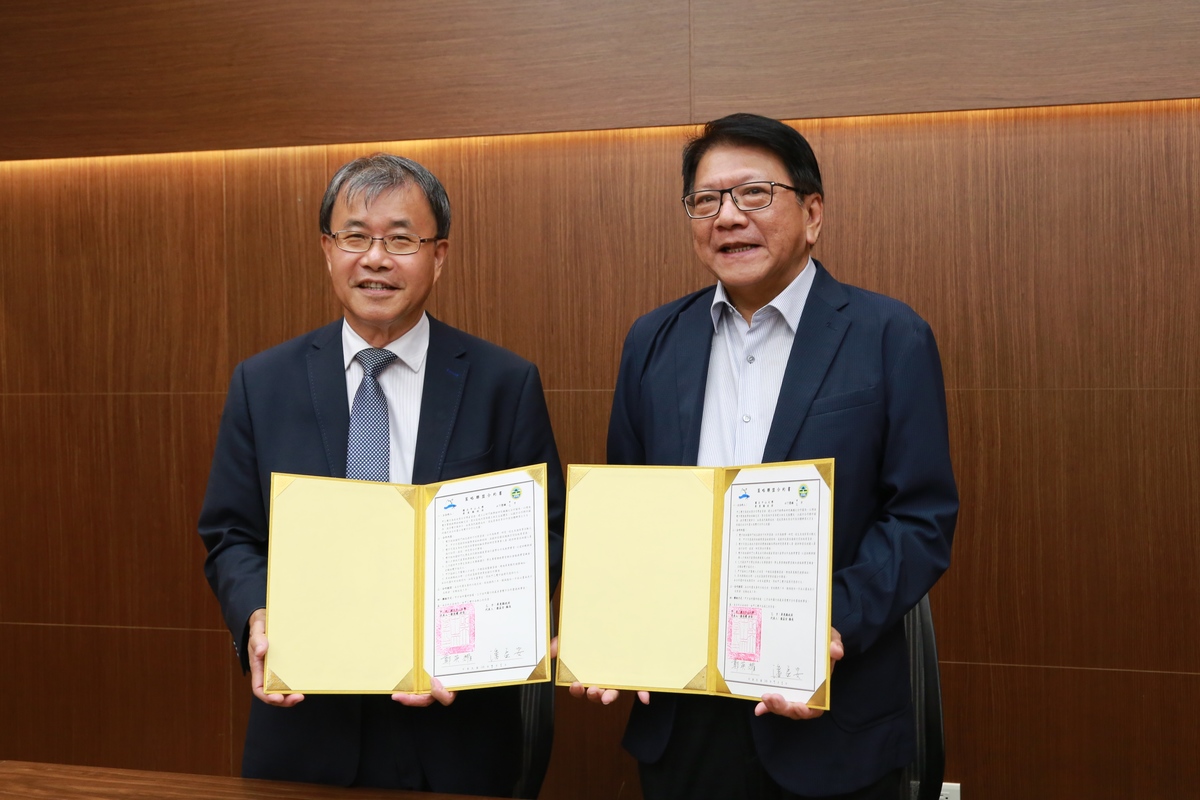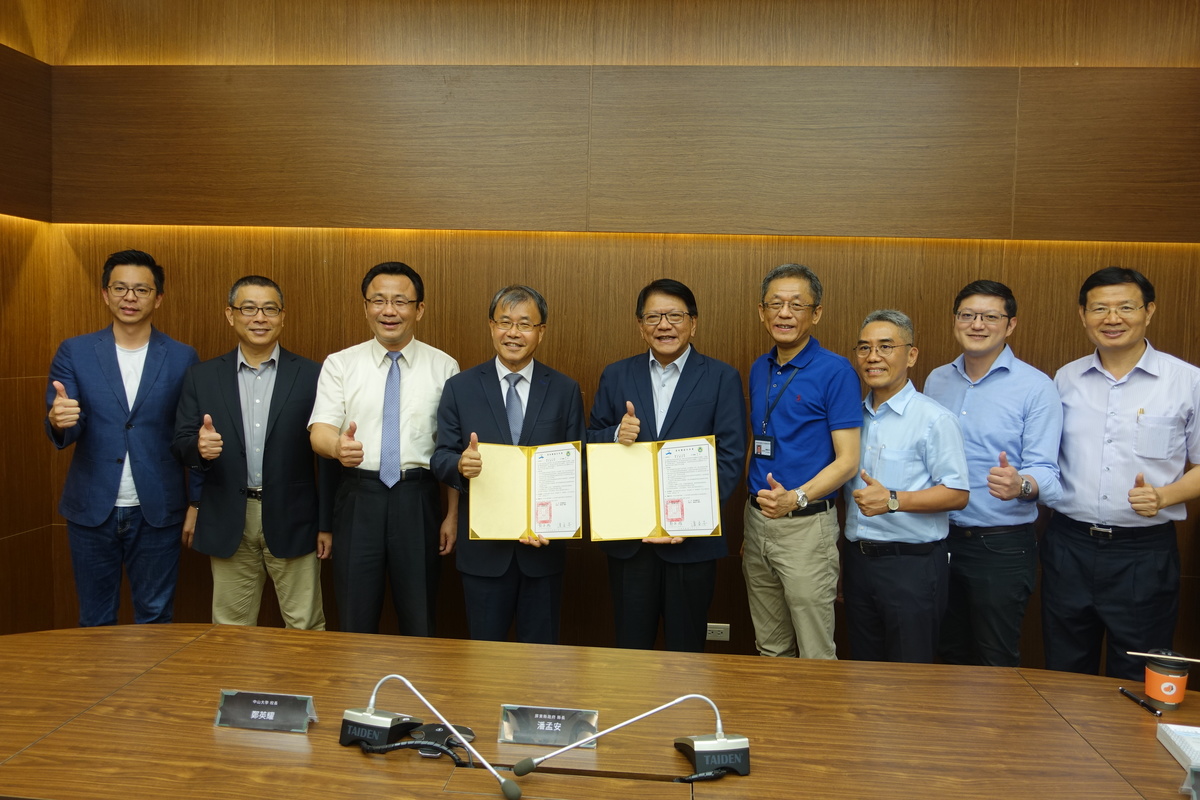NSYSU signs MOU with Pingtung County Mayor Men-An Pan to improve the availability of medical services in rural areas


National Sun Yat-sen University started the process of establishing the College of Medicine to educate medical professionals and help solve the problem of insufficient medical resources in rural areas and outer islands. NSYSU President Ying-Yao Cheng signed a memorandum of understanding on collaboration with Pingtung County Mayor Men-An Pan, concerning the cultivation of medical personnel at NSYSU College of Medicine to improve the availability of medical services in rural areas. In the future, should there be a large-scale epidemic outbreak, NSYSU will help provide first-line medical professionals and the newest medical technologies to improve the quality of healthcare in Pingtung County and safeguard citizens’ health.
The COVID-19 pandemic is putting pressure on healthcare professionals, resources, and services. Pingtung County Mayor Men-An Pan indicated that there is a severe difference in the availability of healthcare resources between urban and rural areas in Taiwan. He pointed out that on average there are 29.28 medical professionals per every 10,000 residents in the whole country and only 18.44 in Pingtung County. The situation is particularly severe in seven townships: Checheng, Shinpi, Shinyuan, Wanluan, Changzhi, Jhutian, and Kanding, where one physician serves an average of over 4000 residents. Nine villages: Manjhou, Sandimen, Wutai, Majia, Taiwu, Laiyi, Chunri, Shizi, and Mudan cover about 60% of the area of the Pingtung County and have an aging population. In Pingtung County there is no major medical teaching hospital, the number of medical professionals in public hospitals is insufficient, and there were some public health centers without directors in the past. Mayor Pan expressed his support and acknowledgment for NSYSU’s College of Medicine in preparation and said that lack of healthcare services should not be the destiny of rural areas. He hopes that NSYSU will contribute to the improvement of this situation in Pingtung County.
NSYSU President Ying-Yao Cheng said that the research results of the field of medicine at NSYSU are outstanding and that the University will cultivate public-financed medical professionals with qualifications in both science and humanities. He emphasized that now, during the global pandemic, medical staff make 4 to 6 ward rounds per day, which carries a risk of contagion. Keeping their spirits up is undoubtedly the key to effective epidemic prevention. The team of the Department of Electrical Engineering, NSYSU, created the first contactless biological sensing system, which can sense the patient’s breathing, heartbeat, and body temperature remotely for 24 hours a day. This system allows the hospital to test the patient’s condition remotely and reduce the risk of contagion.
Besides, laser mass spectrometry developed by Rapid Screening Research Center for Toxicology and Biomedicine (RSRCTB) at NSYSU can detect toxins within one minute by examining the patient’s skin and body fluids. The technology was successfully applied in clinical rapid screening, and in the future, it can be applied in rapid screening for those who are suspected to be infected with SARS-CoV-2. Aerosol Science Research Center, the only one in Asia, has invested in research on preventive medicine related to PM 2.5, aerosol biomedicine, and transmission of SARS-CoV-2 by PM 2.5 and has investigated the possible causes and treatments of diseases of the lungs, respiratory tract and cardiovascular diseases. Center of Crystal Research developed scintillation crystals to be applied as a key element of positron detector, which will be used to diagnose such biomedical diseases as cancer and Alzheimer's disease. The device now can detect tumors as small as 4 mm (previously it could only detect tumors 10 mm big) to help patients obtain a diagnosis and start treatment as early as possible.
NSYSU President Ying-Yao Cheng added that there are only 4 public universities with medical departments in Taiwan, 3 of which are located in Taipei, and 1 in Tainan, while in Kaohsiung, Pingtung, Penghu, and the eastern counties of Taiwan there are none. In the future, if NSYSU successfully becomes the medical hub of the Kaohsiung, Pingtung, Penghu, and the East region, the University will provide assistance for the Ministry of Health and Welfare, design collaboration models between different healthcare-related departments, effectively integrate healthcare resources, improve the situation of insufficient medical resources in rural areas, and strive for social justice in healthcare.
The COVID-19 pandemic is putting pressure on healthcare professionals, resources, and services. Pingtung County Mayor Men-An Pan indicated that there is a severe difference in the availability of healthcare resources between urban and rural areas in Taiwan. He pointed out that on average there are 29.28 medical professionals per every 10,000 residents in the whole country and only 18.44 in Pingtung County. The situation is particularly severe in seven townships: Checheng, Shinpi, Shinyuan, Wanluan, Changzhi, Jhutian, and Kanding, where one physician serves an average of over 4000 residents. Nine villages: Manjhou, Sandimen, Wutai, Majia, Taiwu, Laiyi, Chunri, Shizi, and Mudan cover about 60% of the area of the Pingtung County and have an aging population. In Pingtung County there is no major medical teaching hospital, the number of medical professionals in public hospitals is insufficient, and there were some public health centers without directors in the past. Mayor Pan expressed his support and acknowledgment for NSYSU’s College of Medicine in preparation and said that lack of healthcare services should not be the destiny of rural areas. He hopes that NSYSU will contribute to the improvement of this situation in Pingtung County.
NSYSU President Ying-Yao Cheng said that the research results of the field of medicine at NSYSU are outstanding and that the University will cultivate public-financed medical professionals with qualifications in both science and humanities. He emphasized that now, during the global pandemic, medical staff make 4 to 6 ward rounds per day, which carries a risk of contagion. Keeping their spirits up is undoubtedly the key to effective epidemic prevention. The team of the Department of Electrical Engineering, NSYSU, created the first contactless biological sensing system, which can sense the patient’s breathing, heartbeat, and body temperature remotely for 24 hours a day. This system allows the hospital to test the patient’s condition remotely and reduce the risk of contagion.
Besides, laser mass spectrometry developed by Rapid Screening Research Center for Toxicology and Biomedicine (RSRCTB) at NSYSU can detect toxins within one minute by examining the patient’s skin and body fluids. The technology was successfully applied in clinical rapid screening, and in the future, it can be applied in rapid screening for those who are suspected to be infected with SARS-CoV-2. Aerosol Science Research Center, the only one in Asia, has invested in research on preventive medicine related to PM 2.5, aerosol biomedicine, and transmission of SARS-CoV-2 by PM 2.5 and has investigated the possible causes and treatments of diseases of the lungs, respiratory tract and cardiovascular diseases. Center of Crystal Research developed scintillation crystals to be applied as a key element of positron detector, which will be used to diagnose such biomedical diseases as cancer and Alzheimer's disease. The device now can detect tumors as small as 4 mm (previously it could only detect tumors 10 mm big) to help patients obtain a diagnosis and start treatment as early as possible.
NSYSU President Ying-Yao Cheng added that there are only 4 public universities with medical departments in Taiwan, 3 of which are located in Taipei, and 1 in Tainan, while in Kaohsiung, Pingtung, Penghu, and the eastern counties of Taiwan there are none. In the future, if NSYSU successfully becomes the medical hub of the Kaohsiung, Pingtung, Penghu, and the East region, the University will provide assistance for the Ministry of Health and Welfare, design collaboration models between different healthcare-related departments, effectively integrate healthcare resources, improve the situation of insufficient medical resources in rural areas, and strive for social justice in healthcare.
Click Num:
Share
